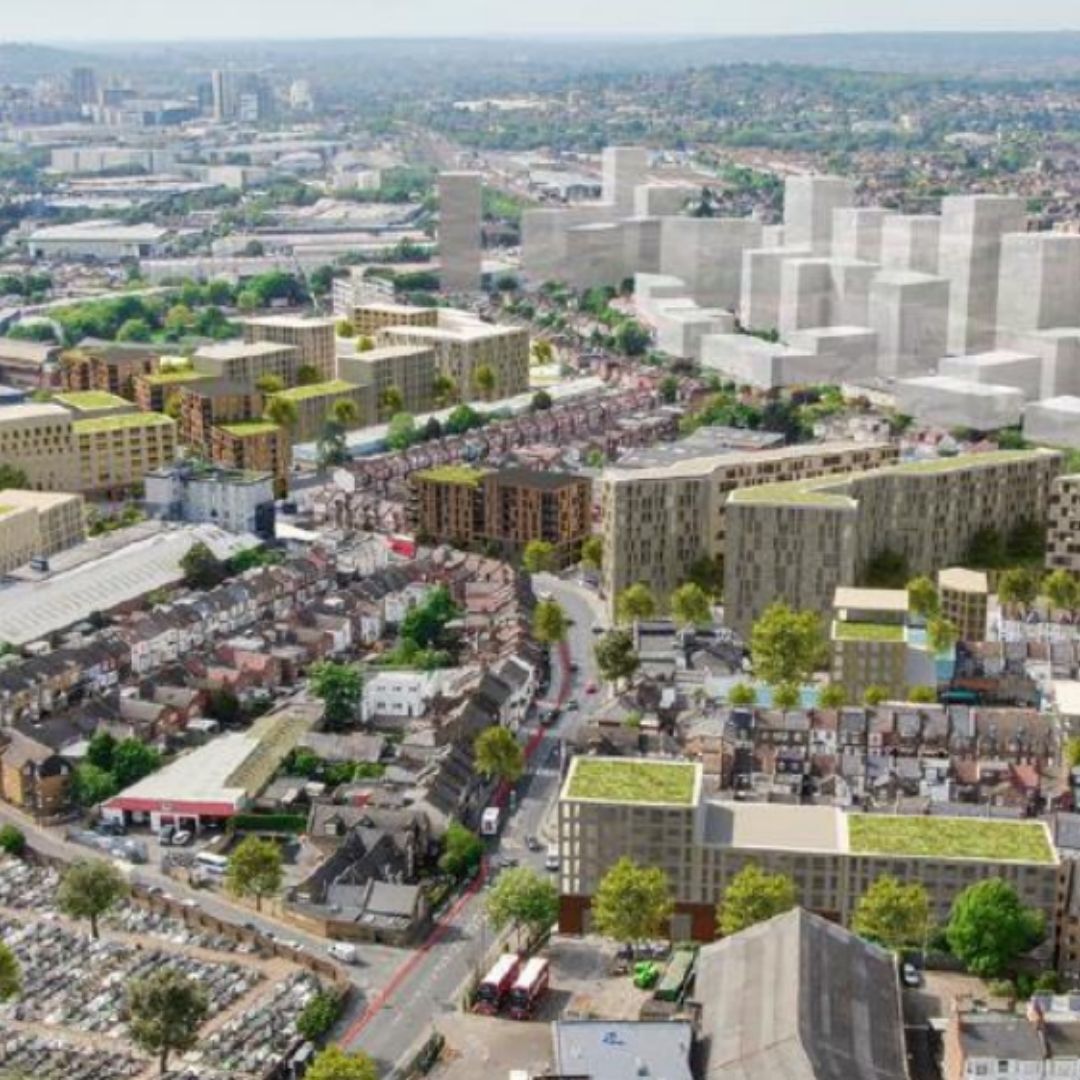Get updates from The Developer straight to your inbox Yes, please!
Church End Growth Area, London Borough of Brent, for Brent Council, with Hawkins\Brown and Jan Kattein Architects

The Church End Growth Area Masterplan and Supplementary Planning Document was informed by face-to-face consultations withe community, a Commonplace online survey and other targeted sessions. The 26ha Church End Masterplan includes 1,300 new homes with an estimated development cost of £525m.
Who is on the project team? (designer, consultants, etc)
Masterplanning: Hawkins\Brown
Engagement and residential design guide: Jan Kattein Architects
Transport Planning advice: P J A
Financial viability assessment B N P Paribas:
Engagement and Consultation: Brent Council
Describe the context of the community engagement. Why did the engagement take place? How were the results of the community engagement shared with the project team and community?
Church End is one the most diverse neighbourhoods in London, (69% BAME). The area is one of the most deprived areas in the UK, with inequalities exacerbated by the impacts of the coronavirus pandemic. Overcrowding, lack of investment, training, employment opportunities and youth services have left local stakeholders, particularly young people, feeling demotivated, lacking trust and hope that Church End could become a better neighborhood. Consultation highlighted a feeling of disconnection between different demographics, cultures and ethnicities: ‘We live together but are not together’ said one local resident’. However, there is a strong appetite for change if regeneration can be rooted in meaningful community and businesses engagement with active participation and collaboration within the decision-making process. Recognising the area’s potential and opportunity for regeneration, Brent’s Local Plan identifies Church End as a Growth Area. Community engagement and consultation activities developed the short-, medium- and longer-term vision for the area, all gathered in the framework for change provided by the Church End Growth Area (CEGA) Masterplan and Supplementary Planning Document (SPD). The document created established a clear, cohesive and strategic regeneration framework to unlock Church End’s potential whilst celebrating its heritage, cultural and diversity of both its established and new communities. Community engagement and consultation activities formed the roots of the project’s success, with feedback being gathered every single step of its development via a variety of different methods including online surveys and mapping, video development, face-to-face events, and traditional paper based media.
Tell us what you did, and how you did it. What was your approach in talking to the community? How did you ensure participants were representative of the demographic of the place and hard-to-reach groups?
The engagement approach developed aimed to maximize response, participation and collaboration:
13x (thirteen) interviews with local stakeholders and community representatives to build a picture of the qualities of the local social infrastructure.
Common Place online platform, with 754 visitors where stakeholders could comment in a map elements they liked and disliked about the area.
1x (one) documentary produced by local young people: Regeneration Gap – YouTube, with 523 views: Regeneration Gap (youtube.com) “We’ve always been creative around here... Even before the lights and the cameras, the whole world wanted to know what Church Road was saying. If you knew about us, you knew you wanted to hear what we had to say.”
2 (two) Interactive workshops with people living and working in Church End, businesses and affordable workspace providers, and community groups
5x (five) Targeted 121 discussions with landowners: meeting those who were in pre-application/application stages – 5 major sites.
1x (one) Businesses survey: shared via post to more than 300 businesses and the team also visited 20 businesses.
1x (one) activity with Leopold Primary School pupils.
1x (one) targeted session with Brent Mencap Politics and Disabilities Group: to understand wider role of the area to be more attractive and accessible.
2x (two) outdoor engagement activities in different parts of the Masterplan process, with over 100 people attendance.
4x (four) face-to-face events part of the statutory consultation process, to gather feedback once designs were finalized with over 600 people attendance.
How was the feedback incorporated into decision making? Can you share how the project outcome has been shaped by the engagement?
The project placed community engagement and feedback at the forefront of the document design/development:
Phase 1 - Understanding Current Setting: The team conducted interviews, launched an online platform, and engaged on a 121 basis with local stakeholders to comprehend the area’s dynamics. Discoveries included struggles in existing community spaces, the need for opportunities for young people, and a consensus that renewal was overdue.
Phase 2 – Initial Sketches: Interactive workshops and events were conducted to test ideas. Insights were gained into the economic potential of industrial sites, desirable locations for new community spaces, and young people’s enthusiasm to be involved. Businesses emphasized the importance of the high street for social interactions.
Phase 3 – Refining Drawings: Proposals for housing, businesses, green spaces, and social infrastructure were refined based on feedback. An open day event showcased detailed plans, receiving positive feedback. Ongoing concerns included lack of affordable housing and crime.
Phase 4 – Finalizing the Plans: While acknowledging the masterplan SPD couldn’t solve all local issues, it aimed to attract investment. Funding applications secured over £3m. Designs were finalized shaped the Masterplan SPD document, which underwent statutory consultation.
Information about the CEGA consultation reached 16,000 people. Consultation events saw over 700 attendees, in total. During the 7-week consultation, 116 people provided comments, with the majority expressing support: ‘‘The Masterplan SPD identifies all deficiencies and has correct priorities. If even half of the plan is delivered in 10-15 years, it will be a major improvement to the area.’
Sign up to our newsletter
Get updates from The Developer straight to your inbox
Thanks to our organisation members
© Festival of Place - Tweak Ltd., 124 City Road, London, EC1V 2NX. Tel: 020 3326 7238